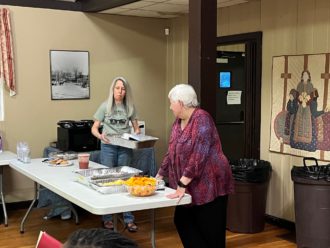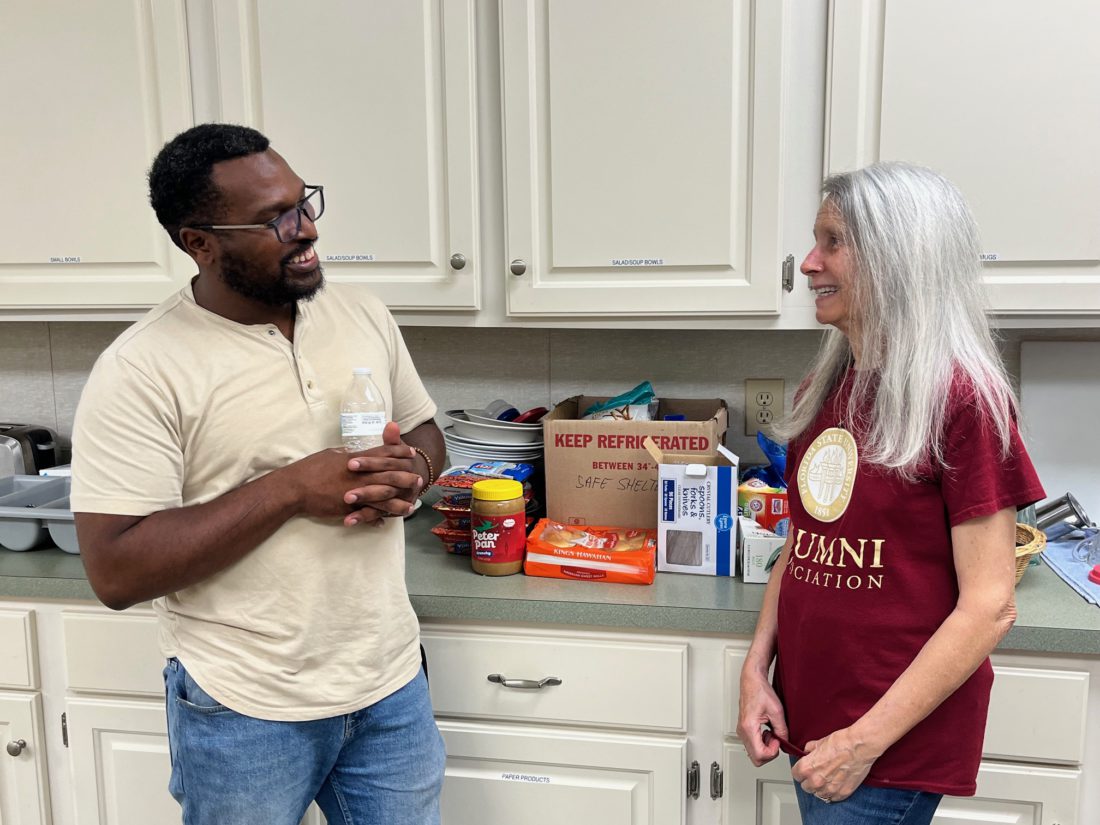In early May, volunteers from Grace Episcopal Church unwrapped aluminum platters of bean burritos and corn on the cob as they set up for dinner in their fellowship hall. The Merrimon Avenue church was hosting its first Wednesday meal with Safe Shelter — an initiative that collaborates with local organizations and houses of worship to provide beds for traditionally underserved homeless populations, such as families, LGBTQ individuals and people of color.
In addition to feeding unhoused guests, these Wednesday evening meals invite the broader community to join. For the May 1 dinner, the Rev. Dustin Mailman, pastor of family ministries and missions at Trinity United Methodist Church (TUMC) and his wife, the Rev. Katlyn Zulinke, Safe Shelter’s development specialist, arrived with their sleepy newborn in a stroller. A volunteer positioned a vase of irises from her garden atop the dinner table.
Amid conversation, a mother and four kids, all carrying black garbage bags as luggage, called out thanks to Safe Shelter staff and made their way through the fellowship hall. But before they could leave, one kid’s bag ripped, and her clothes spilled onto the floor. A Safe Shelter volunteer darted into Grace Episcopal’s kitchen to retrieve a replacement.
With the family departed, volunteers wielded kitchen tongs and filled guests’ plates with burritos and corncobs. When community health worker Shana Baynard updated the crowd that the family who had just left had been housed, everyone at the table erupted in applause.
The applause repeated not long after when a volunteer shared that he’d made a chocolate pie for dessert.
Grace opens its doors
Safe Shelter operated at Grace Episcopal through May — its first time under the church’s roof. A previous effort to do so collapsed in the fall, following pushback from residents in North Asheville who voiced concerns over potential crime and drug use. Ultimately, the Rev. Milly Morrow, the rector of Grace Episcopal, withdrew the church from consideration, citing safety concerns for the facility’s would-be temporary guests.
But in March, Safe Shelter again reached out to Morrow after its six-month lease with Homeward Bound’s AHOPE Day Center on North Ann Street wasn’t renewed due to the challenges of operating a 24/7 shelter.
Morrow consulted with her congregation, which remained interested in hosting. As reported by Asheville Watchdog, neighbors once again spoke out against the move. Some reiterated previous concerns, while others voiced frustrations over what they viewed as the church’s lack of communication regarding its latest plan. After a community meeting at the church to address the disputes, the congregation moved forward.
“There’s a crisis,” explains Katherine Kaderabek, a member of Grace Episcopal’s vestry and a Safe Shelter volunteer. “These are families who need shelter. We have it to offer.”
Congregants like Kaderabek have volunteered with Safe Shelter at its other locations, as well as temporary shelters such as Winter Safe Shelter at West Asheville Presbyterian Church and Code Purple emergency shelters at TUMC.
On April 29, Grace Episcopal opened its doors to five families with school-age or day-care-age kids and six adults who were homeless, says Safe Shelter director Christian Chambers. Among the inaugural group at Grace Episcopal who arrived April 29 were four working adults and a senior couple on disability who stayed at Safe Shelter until an apartment became available, Chambers says. Individual guests slept on mattresses in the church’s fellowship hall, while families slept in classrooms.
However, the composition of guests changed occasionally over the monthlong stay — a common occurrence at all host locations. When an individual or a family moves out to permanent housing, transitional housing or with family or friends, partner organizations in Asheville are ready with a referral list for new folks, says Chambers. These include Eliada Homes, a nonprofit serving underresourced children, and local McKinney-Vento specialists, a federal program that ensures children who are homeless are enrolled in school.
By the end of May, Grace Episcopal had hosted 30 people total — including six families with 15 children among them, says Zulinke.
New digs
In June, TUMC took over as host of the temporary shelter. Once again, Xpress joined a Wednesday evening dinner.

Nineteen people — four families and seven individuals — were staying at Safe Shelter that night.
The evening’s dinner was slightly more chaotic, due to several preschool-age guests joyously embroiled in a game of chase. Their mothers tried — and tried — to tempt them to the dinner tables set up around the hall. Occasionally, these parents managed to pop a small bite of lasagna into their mouths, but mostly, the children’s playing proved too much fun.
In addition to serving the homeless, the TUMC fellowship hall is also available to other community organizations, Chambers says. Asheville PEAK Academy, a public charter school with a majority Black student body, uses the space as its cafeteria. PEAK’s building is behind TUMC, and they share a parking lot. Additionally, the nonprofit Umoja Health, Wellness and Justice Collective operates its after-school program in TUMC’s fellowship hall until 6:30 each evening. Safe Shelter residents are not present during either program, Chambers says.
‘Serious about safety’
Drug use and mental illnesses were among the concerns raised by neighbors of Grace Episcopal.
Chambers reiterates that one of Safe Shelter’s key demographics is families. “We are very serious about the safety of our neighbors and our kids,” he says.
Safe Shelter guests are required to sign an agreement to abide by rules, including a prohibition on drugs and alcohol. In all instances where drug or alcohol use is discovered, the individual must leave. “They would no longer be allowed to be at Safe Shelter,” Chambers says.
According to Chambers, he asked one individual staying at Grace Episcopal who was not following the shelter rules to leave; he declined to share the reason out of respect for the person’s privacy. Upon agreeing to leave, that person was taken to a different shelter the same night. The only time the Asheville Police Department visited Grace Episcopal during Safe Shelter’s stay, Chambers continues, was when officers conducted routine checks on the church property. Safe Shelter staff did call for an ambulance once when a guest experienced a health emergency, he adds.
Safe Shelter also has a curfew. Lights out occurs at 10 p.m.; Chambers notes the children are usually in bed by 9 p.m.
When asked by Xpress whether Safe Shelter had heard any complaints from Grace Episcopal neighbors while hosting the temporary shelter, Chambers replied, “Not a peep.”
Xpress reached out to multiple residents at the start of Safe Shelter at Grace Episcopal. Only one resident, Bill Whalen, shared his concerns. Whalen did not reply to subsequent outreach regarding the implementation of the shelter. Grace Episcopal neighbor James Whittle wrote Xpress in a June 28 email, “We did not encounter any negative incidents in the neighborhood. In fact, had we not been told about Safe Shelter, we would have never even known it was operating there. We are happy they are doing it.”
Zulinke tells Xpress that Safe Shelter leadership wasn’t contacted by TUMC’s neighbors before coming there.
‘Deep ties’
Chambers became director of Safe Shelter in October and has previously worked at AHOPE. He wishes the community saw Safe Shelter’s on-site staff as an asset to the community, who can quickly defuse any situation that may arise.
The group, including operations manager Gene Ettison and community health worker and recovery coach Traci Ettison, have “very deep ties with the homeless community,” says Chambers. “And we also have a lot of respect.”
For example, if people who weren’t staying at Safe Shelter were trespassing on its property, the staff would likely know them by name and would be able to ask them to move along without escalation, Chambers explains.
“Neighbors can get benefits that they weren’t even previously getting,” he says.
Chambers emphasizes that the shelter’s time at each participating location is temporary. On July 1, the program transitioned to Acton United Methodist Church. Come August, First Presbyterian Church, 40 Church St., is prepared to host guests for one month.
Looking ahead, Chambers says Safe Shelter does have aspirations to collaborate with organizations willing to house its clients for a longer time.
An ideal spot, he continues, would be located near a bus stop, have showers and a kitchen on-site, and an outdoor place where kids could safely “just run around, be loud if they want to.”
Update, July 11, 2024: Safe Shelter’s location for August 2024 has been updated in this article.




I sure hope Honor Moor and all her friends with their million dollar homes who didn’t want Safe Shelter in their neighborhood read this and see that the residents were not drug addicts but families who needed a little support.
Under Rev. Milly Morrow’s leadership Grace Episcopal is walking the walk and doing the work that all followers of Jesus should be doing.
Leave it to a woman. This is how genuine christians give back. #taxthechurches